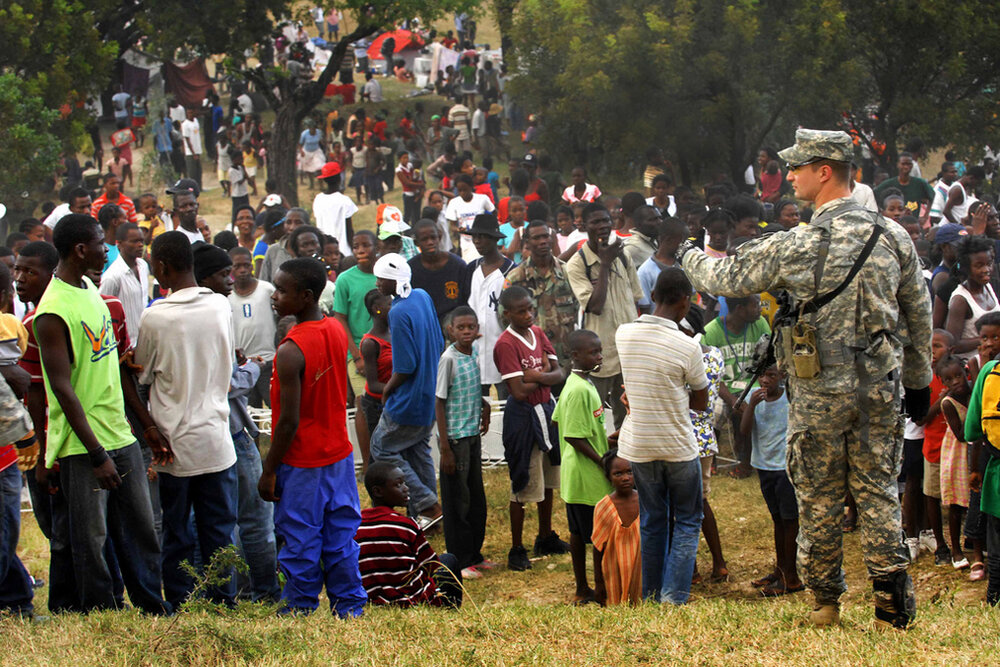Humanitarian assistance or military intervention in Haiti

TEHRAN - During eighteenth century, France created a powerful export economy based upon slavery in Haiti. In 1730, the population of the Caribbean country was about 83 thousand and in 1789 there were more than 500 thousand people, of whom 450 thousand were slaves. Due to massive mortality and low birth rates among the slaves, France saved one million slave from Africa to Haiti between 1750 and 1789 to maintain their populations. In 1789, Haiti produced three quarters of the world's sugar.
Haiti became independent after a series of devastating wars in 1804. The great powers did not recognize this Independence. In 1825, something strange happened. France recognized Haitian franchises for 150 million francs and 50 percent reduction in customs duties on French goods. The proposal was accompanied by the French and British Navy's naval blockade threat. Haiti was forced to borrow 30 million francs from France for the first payment. Eventually, the country paid off the entire loan in 1893.
Trade relations between the United States and Haiti date back to the late eighteenth century when Haiti was still the French colony. Haiti became independent in 1804. Former U.S. President Thomas Jefferson said: “The freedom of slaves in Haiti is a bad example. The U.S. government recognized Haitian government after the U.S. abolished slavery.”
The U.S. occupied Haiti for the first time in 1915 which lasted for 19 years. During this period Haiti turned into a sugar factory, under the control of New York banking, which resulted in massive poverty of Haitians.
In April 2003, Aristide called for a refund of French-backed compensation from Haiti, with an estimated value of $22 billion, but President Chirac refused to repay it. The first elected president of the popular Jean Betrand Aristide in Haiti was overthrown in 2004 with a coup supported by the international community in accordance with the interests of France and backed by America. The military coup led the country to an unprecedented economic, political and humanitarian crisis. Subsequently, high political instability, a massive institutional fragility (mainly caused by foreign intervention through humanitarian assistance), and the structural crisis of poverty (affecting 80% of the population) continued, while the humanitarian assistance and aid were delivered to intervene in the country’s affairs.
The passage of time indicates that the U.S. imperialist government has taken advantage of the situation of the affluent nations of the Caribbean to expand its military occupation spectrum. The strategies applied by U.S. forces to control and occupy the Port-au-Prince airport were through holding the entry of food, water and medical services.
The late Hugo Chavez in Anzan emphasized that imperialism shamelessly lies on the bodies of the Haitian who are under the rubble of earthquakes and are crying. They took control of the airport (Puerto Princesa) and will arrive at the Presidential Palace.”
In turn, Nicaraguan President Daniel Ortega emphasized that “The United States has deployed the nation's plight and deployed its military forces to control the military command of the Puerto Princesa airport, alarming.” Similarly, Uruguayan defense minister Luis Rosadilla called the situation in Haiti “deeply disturbing” and said, “This Latin American country does not need weapons, but needs medical equipment, food and water.”
This peaceful peacekeeping mission since 2004 has sponsored more than 7,000 peacekeepers, 2,000 policemen and 1,000 civilian personnel to prevent a civil war. 16,000 U.S. soldiers and military ships are currently stationed in the country to prevent mass exodus.
The deployment of troops in the name of humanitarian assistance to this country is an example of an attack and intervention in this country, and before it imposed dictatorship, the Maquilas plunderous policy, commercial agreements and Haitian militias placed Haiti among the poorest countries.
A report from Haiti by Simon Bruno's independent correspondent at that time read, “There are currently no government in Haiti, the decision maker is the United States through the United Nations ... I believe that Haiti's biggest problem is the United Nations.” Several reports from Oxfam stated that restructuring is very slow in the country.
The United Nations Stabilization Mission in Haiti reported a huge social gap between millions of poor people and said small, domestic and foreign minorities benefit from Haiti.
Two years after the devastating earthquake of 2010, 519,000 Haitians lived in 758 camps and tents in the Puerto Príncipe countryside and worse than that was the outbreak of cholera, which is believed to infect citizens through polluted water which came from one of the United Nations Mission in Haiti (MINUSTAH). Water pollution killed thousands of people in Haiti.
About 10,000 people were killed that year, and more than 18 percent of the victims died in the 2015 cholera outbreak.
According to the Associated Press, for every dollar, the U.S. benefited 33 cents of the initial disaster assistance, amounted to $379 million that it provided for Haiti.
Out of anger, citizens have taken to the streets to voice an objection to the U.S. and they demand a change in the government. However, Trump supports the incumbent government and urges the citizens to keep calm.
Leave a Comment